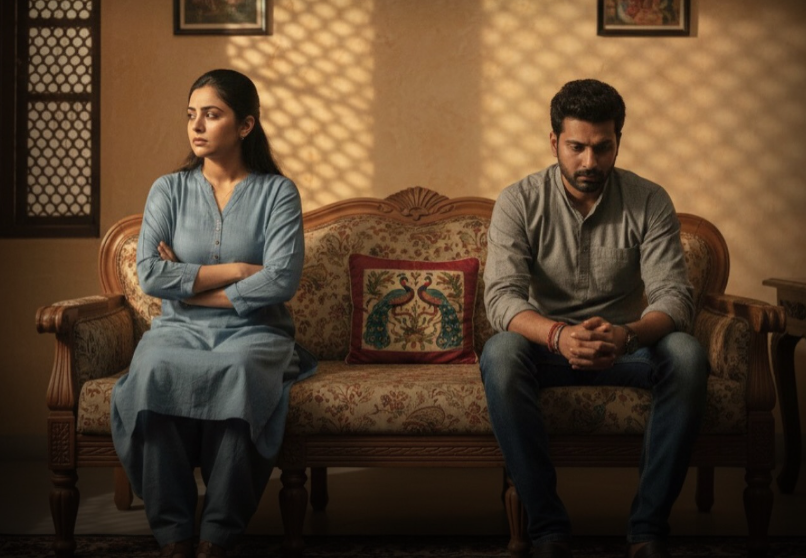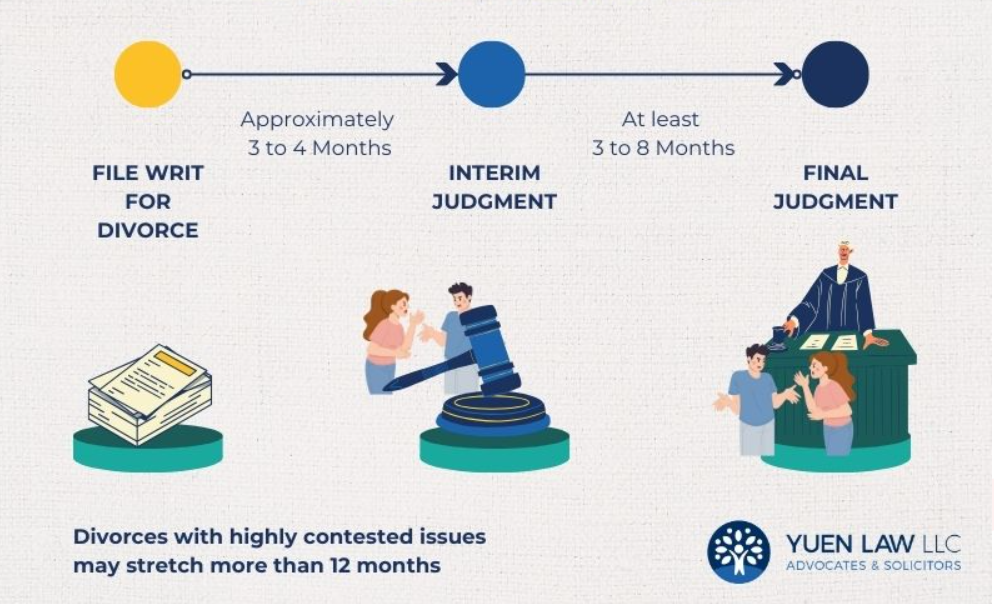How Much Time Does It Take to Get Divorce in India? Truth Revealed
If you’re considering how to end your marriage in India, there’s one question that likely tops the list: how long is this going to take? The answer isn’t straightforward, and this is what most people find annoying. Some divorces are over in 6 months, others take years. Here’s everything you need to know about divorce timelines in India, sans the confusing legalese.
Why It’s Hard to Get a Divorce in India
But FYI, before we get into the actual timelines you need to know why Indian divorces are not swift. Our judicial system is complex, and there are a couple of stages to the divorce process. It’s like a video game with different levels — you can’t get to the end without playing.
Thousands of divorce cases are going through Indian courts every day. You and your case are a drop in the bucket, so you have to wait, that is normal. And the law provides time for couples to cool off and perhaps mend the relationship. They don’t want rash decisions made that people will later regret.
Kinds of Divorce That Impact Timelines
All divorces are not created equal. The type of the one you file can make a big difference in timing.
Mutual Consent Divorce: The Quicker Way Out
This is a situation where both husband and wife decide to terminate the marriage. Nobody’s fighting, blaming, or arguing. You both just want out.
Timeline Breakdown:
| Stage | Average Time Needed | What You Must Do |
|---|---|---|
| Filing Petition | 1-2 weeks | File papers with courthouse |
| First Waiting Period | 6 months (minimum) | Let time pass |
| Second Motion | 1-3 months | Attend final court hearing |
| Decree Issued | 2-4 weeks | Official divorce granted |
| Total Time | 7-10 months | The whole shebang |
You are subject to the 6 month waiting period by law. It’s known as the “cooling-off period.” The court needs you to be 100 percent certain. Within this period, you can change your mind without any penalty.
Some good news: The Supreme Court said in 2021 that in some special cases, this 6-month period can be waived. But don’t count on it — courts hardly ever make this sort of leap unless there’s a truly compelling reason.
Contested Divorce: The Long Battle
This occurs when one person wants a divorce, but the other does not. Or both want the divorce but can’t agree on money, property or child custody. These cases take much longer.
Typical Timeline:
Year 1: Petition, notices, initial hearings, evidence gathering
Years 2-3: Several court dates, witness statements, fighting
Year 4-5 (or longer): Closing arguments, ruling
The contested divorces take 3 to 5 years in India and some may go beyond 7 years. Yes, you read that correctly—seven years.
What Slows — or Quickens — Your Divorce
There are a number of factors that determine the speed at which your divorce occurs. Here are the main reasons.
Court Workload in Your City
The family courts in large cities like Delhi, Mumbai and Bangalore are clogged beyond capacity. You’re also likely to have your case move faster in a small town, if you file there primarily as a matter of volume (there are fewer cases).
In major cities, family courts at times have backlogs of thousands of cases. Your case is scheduled, but then it might be postponed a number of times due to court congestion.
How Cooperative Your Spouse Is
If the spouse doesn’t attend court, requests for postponements or opposition with counter-cases are made, the process is stalled. Some people drag their feet because they are angry, not just as an interest calculation technique to improve common financial settlements.
Quality of Your Lawyer
A good divorce lawyer understands the system, gets things done on time and doesn’t dillydally. A lazy and/or bad lawyer will stretch your case for no reason. Choose wisely—this person controls your timeline. For more guidance on choosing the right legal representation, visit https://zistalegalis.com.
Complicated Issues
Uncomplicated divorces, with no kids, squabbling over property or harassment for alimony, move more quickly. The moment you add:
- Child custody battles
- Property division fights
- Alimony disagreements
- Accusations of domestic violence
Your timeline doubles or triples.
Religion Matters: Different Laws, Different Timelines
India has several marriage laws based on religion. This affects divorce timelines too.
Hindu Divorce (Hindu Marriage Act, 1955)
Applies to Hindus, Jains and Sikhs. Much of what we have discussed enters in here. It is this law which includes the provision of six month’s wait before giving mutual consent.
Muslim Divorce (Dissolution of Muslim Marriages Act, 1939)
In some cases, Muslim divorces can be speedier. The process is separate and distinct for triple talaq (talaq-e-bidat), khula and mutual consent under the Act of dissolution. Timeline: 3 months to 2 years, depending on the circumstances.
Christian Divorce (Indian Divorce Act, 1869)
Christians must demonstrate particular reasons for divorce, such as adultery, cruelty or desertion. These cases are usually contested. Timeline: About 2 to 5 years, on average.
Special Marriage Act (1954)
In the case of inter-religion marriage or marriages under this Act, Hindu Marriage Act timelines apply mutatis mutandis. Mutual consent: 7-10 months. Contested: 3-5 years.
Step-by-Step: What Actually Happens
Let’s go over a mutual consent divorce, so you will recognize what to expect.
Month 1: You decide to get a divorce. You both hire lawyers and prepare the divorce petition jointly. The petition contains proposed agreements regarding property, alimony, and children if any.
Month 2: Petition family court. Pay the court fees (normally ₹1,000-5,000 depending on your city).
Month 3: First hearing. You both stand in front of the judge. The judge just needs to ask if you’re sure and explain what’s at stake. The court records your statements.
Months 3-9: The 6-month waiting period required by law starts. You go home and wait. The court will not take any action during this period besides to observe that you’re still pondering.
Month 9: Second motion goes on file. This communicates to the court that you are maintaining your position with respect to the divorce. Another hearing is scheduled.
Month 10: Final hearing. If both still consent, the judge signs the divorce decree. You’re officially divorced.
Month 11: Pick up your divorce papers from court. Done.
Can You Speed Things Up?
People always ask this. Here’s what actually works:
For Mutual Consent Divorces
Be ready: Get all documents in before filing (marriage certificate, address proof, income docs, photographs).
Appear at all hearings: Do not just let dates slide. Adding 2-3 months for each missed hearing.
Seek a waiver: If there are circumstances that justify an exception — for example, if you’ve long been living apart — your lawyer can ask the Supreme Court to waive the 6-month holding pattern.
Utilize mediation centers: There are many courts that have mediation facilities to bring finality quicker.
For Contested Divorces
Think about mutual consent: If you can, sit across the table and negotiate with your spouse. Offer fair terms. An amicable divorce, even if there is just a fair settlement, beats years of war.
Get yourself a good family lawyer: Worth every rupee.
Write everything down: Proof expedites matters. Photos, texts, witnesses, medical records — collect it all.
Go to counseling: The courts look favorably upon couples who make the attempt to go through counseling. Even if it doesn’t succeed, it evidences good faith.
The Actual Price: Dollars and Feelings
Divorce isn’t just about time. Let’s talk about what else you’ll spend.
Financial Costs
Mutual Consent Divorce:
- Lawyer fees: ₹15,000 – ₹50,000
- Court fees: ₹1,000 – ₹5,000
- Documentation: ₹2,000 – ₹5,000
- Total: ₹18,000 – ₹60,000
Contested Divorce:
- Lawyer fees: Starting from ₹50,000 – up to ₹5,00,000 (upward range is not limited)
- Court fees: ₹5,000 – ₹20,000
- Expert witnesses: ₹10,000 – ₹50,000
- Detectives (at times): ₹20,000 – ₹1,00,000
- Total: ₹85,000 – ₹7,00,000+
These are rough estimates. Big-city lawyers charge more. Celebrity lawyers charge astronomical fees.
Emotional Costs
Nobody talks about this enough. Divorce is exhausting. You’ll go to court dates, dredge up painful memories and face social judgment (especially in small towns). The more you wait, the more difficult it becomes.
Children bear the brunt when divorces slog along. If you have children, specify some of their spiritual health when you choose to fight and when to compromise.
Recent Adoptions in Indian Laws for Divorce
The Indian judiciary is gradually moving forward. Here are recent developments:
2021 Supreme Court verdict: Courts can reduce 6-month waiting period in mutual consent cases. This is huge, but the extent of its implementation can differ widely from court to court.
Zoom Calls: Many family courts now hold video calls in light of the pandemic. This saves time and travel. Not all courts have done so yet.
Forced Counseling: Some divorcees are being forced to take counseling sessions before they can go through with their divorce. That adds time, but can help some couples reconcile or separate more amicably.
Faster Track for Abandoned Spouses: Courts will look more favorably at accelerating proceedings if one spouse has deserted the other.
After the Divorce Decree
Just because there is a piece of paper called a divorce decree doesn’t mean everything’s done. You still need to:
Update legal papers: Change your name in passport, bank accounts, PAN card, Aadhar card, etc.
Close on settlements: Deed property, pay alimony and set custody schedules.
Wait to remarry: Legally, you can marry someone else after your divorce is final in most cases. But you should finish all settlements first to prevent problems. For comprehensive legal guidance on post-divorce matters, visit https://zistalegalis.com.
Should You Wait or Fight?
This is the question on everyone’s mind. Here’s practical advice:
Choose mutual consent if:
- Your partner is down to compromise
- You want to move on with life
- You can be flexible on some demands
- You’re trying to limit harm to children
- The relationship is beyond repair
Fight a contested divorce if:
- Your spouse is actually abusive or harmful
- Child safety is at risk
- Your husband or wife is hiding assets, or not telling the truth
- You are being given a scandalously bad deal
- You got some good evidence for your case
Most legal scholars concur: unless there’s abuse, violence or some serious injustice, consent is best. Sure, you might wind up with less money or property. But you gain years of your life back.
Frequently Asked Questions
Can I get divorced right after getting married?
Technically no. You have to be married at least one year before you can seek divorce under most marriage laws in India. There are exceptions for extreme cruelty or serious abuse.
What if I’m married to someone who does not live in my city or country?
You can still seek a divorce in the city where you most recently resided together, or where the marriage was registered. If your spouse is living abroad, notices are served at his or her last known address. This may add 3-6 months to the schedule.
Do I need to go to every court date?
For mutual consent divorces, yes. The court must ensure that both parties continue to agree. In contested divorces, your attorney may be able to attend in your place sometimes, but you will have to show up for important hearings.
Can my parents or relatives accompany me to court?
In family courts, one family member is typically permitted to accompany you for emotional support; they are not allowed to speak during the proceedings unless they have been called as a witness.
What if we get back together during the waiting period?
You can dismiss your divorce anytime before the final judgment. Report to your lawyer, file a withdrawal application and off it goes. No penalties.
Is there a statute of limitation to file for divorce after separation?
There is not a specific time limit however, the longer your separation lasts, the stronger your divorce case becomes. One year living apart may be a ground for divorce in some laws. Mutual consent cases are even easier when the parties have been separated for two years.
Can I date other people while my divorce is pending?
Theoretically, you are not divorced until the divorce decree is entered. Beginning another relationship now would only add to the problems and turn a bad situation into one that’s much worse. Most lawyers advise waiting.
What if I can’t get a lawyer?
All district courts have legal aid services. Free attorneys are available for those who cannot afford legal fees. The quality of service is inconsistent, but it sure beats going solo. You can also actually contact your state’s legal services authority.
Bottom Line: What to Know
Divorce is a slow process in India – there is no magic bullet. Consensual divorces get settlements in 7-10 months minimum. Contested cases can take 3-5 years, if not longer. That’s the reality.
The system may be long, but it is designed to protect families and provide time for second thoughts. Whether that is a good or bad thing depends on your situation.
If you’re on the road to divorce, here’s the best advice: see if you can use mutual consent first. Negotiate honestly. Consider what’s more important to you—winning the argument or getting on with life? Fighting mostly isn’t worth the years you take off your life, people say.
Find a great lawyer who tells you things straight and gets the work done on time. Attend every court date. While on the stand, maintain your composure. Concentrate on practical remedies, not vengeance.
And remember: This hard period is bound to come to an end. The divorce will happen. You’ll move forward. Thousands of people negotiate this system every year and emerge stronger. You can too.
It may seem to take forever right now, but it is still less time than you are talking about spending locked in an unhappy marriage. Even a few years of fighting the legal battles will be worth its weight in gold when you think of your peace and happiness down the road.





